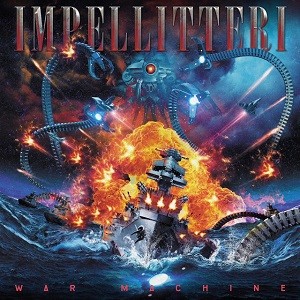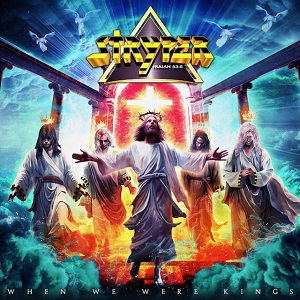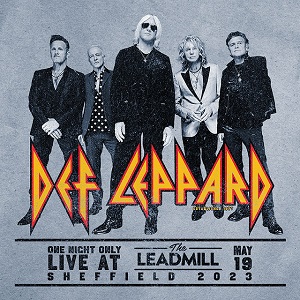ACCEPT’s WOLF HOFFMANN Talks Humanoid – "Nothing Artificial"
April 21, 2024, 7 months ago
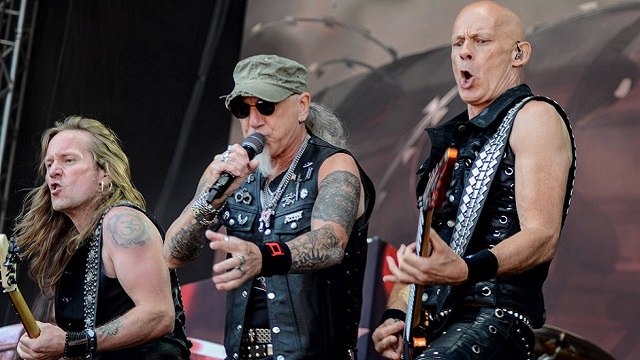
"The excitement and fire that's associated with heavy metal, it only works if you play live. Dancers use a lot of tapes and playback stuff, but for Accept, that's the wrong way to go. There's a certain charm in imperfection. As humans, we all make mistakes. We can never play 100%, ever, even though sometimes we think we do. That's what fans love. It's a human experience, seeing some go onstage and sweat their ass off, playing instruments, singing...If it's not live anymore, something gets lost."
To quote Metal Church, "Sincerity is felt much more when the human factor shows." Social media, cellphones and artificial intelligence (AI), our reliance on technology is stripping away our individuality. Folks like Elon Musk wants to implant computer chips directly in the brain, further eradicating our humanity. Is it too late? Have we gone too far? Accept offer a warning, on Humanoid. "I'm a little afraid that humanity gets lost in all this stuff," says Wolf Hoffmann. "There's a reason all these strikes happened in the movie industry, because people are afraid that pretty soon, any artist will become obsolete. That (technology) is getting scary good. The days are passed, when you thought, 'Maybe one day...' It's already here man! It's a scary thought, how's the world's gonna look in a few years, if it's already this good now. Are people even going to give a shit about song writers, or human emotions and stuff? Are the days numbered, for real artists?"
The guitarist sees both sides of the coin. "In a weird way, it's super exciting times. This Digital Revolution has a huge impact, probably bigger than anything humankind has ever gone through. The Industrial Revolution was huge, but this might be bigger, and we're just at the beginning of it." While not a concept album, Analog Man (aka singer Mark Tornillo) will never fully embrace this digital age, so he counterbalances the title track with emotions and frailties from various points in our lives. That includes the characteristics that make us uniquely human: feeling uncomfortable, getting older, dealing with hurt/disappointment and the final stop for everyone, death.

Neither preachy, nor heavy handed, the long running German-American alliance has never shied away from hot-button issues. At the same time, this subtly nuanced platter isn't without a tongue-in-cheek sense of humor, as well as touching on the Biblical reckoning, an ode to concert audiences, a new spin on the Frankenstein story and what surely would have been a Bon Scott approved drinking song. Humanoid has a little something targeting the head, heart, gut and... balls!
Since the days of The Beatles' Hamburg residency, Germany has been a fertile ground for rock music. With all the current multi-day festivals, high profile tours and flood of bands, hard to believe there was a time when the English speaking media cited geography, language barrier and old cultural biases as excuses to ignore foreign talent. Accept persevered, and released music that could not be ignored. The sound, look and lively show quickly became THE blueprint for countless others, including the biggest names in metal, who freely acknowledge the influence. Outside of Germany, and a handful of lucky Dutch headbangers, the first the metallic world heard of Accept, was when a solo Wolf Hoffmann adorned the cover of ‘80s UK metal Bible, Kerrang, with his trusty Flying V in hand. The instrument earned the band instant notoriety and credibility in the underground. So imagine the joy in discovering the band actually employed two such wicked icons (even if they burned them in effigy on the Restless & Wild cover).
An international love affair was born, that has continued for more than forty years. The follow-up, Balls To The Wall firmly planted them on the international map, as well as TVs/video screens around the globe. Accept garnered fans in territories they'd yet to play, and even earned a gold record in the States. Too Mean To Die resulted in one of their most successful tours to date, gracing festival stages, as well as headlining both sides of the Atlantic, including the first such US stint, in over a decade. As they now unleash Humanoid, the debut for Napalm Records, Accept, 2024, are still masterfully guided by Hoffmann, the lone original member. He no longer stands alone, with lyrical and musical input welcome from all quarters. "I'm usually the one starts the process, but I never say people have to, or are not allowed to contribute. There's never any formula. It's different with every album."

People get the false impression that Accept is just a Hoffman-Tornillo show. No way. For the new album Uwe Lulis (guitar) and Martin Motnik (bass) contributed several ideas. "I spent a few days songwriting and gathering musical ideas with Uwe. He had one of these half-finished songs, called 'Frankenstein'. We started putting words to it, what would this Frankenstein say... As a songwriter, I'm always happy if I get inspired by anything! Nothing is worse than sitting there, and not having a clue about what you should write about. With Frankenstein, that old movie, 'It's alive!' It's always good if you have a movie playing in your head, while you write a song."
Greeted by a fierce jolt of electricity (courtesy of Hoffman's guitar),"Frankenstein" deals with the Mary Shelley tome. Paired back-to-back, with the title track, there's a thematic link to "Humanoid," as well as today's news headlines, where scientists propose transplanting brains, or maybe just thoughts/consciousness, into a new body, or even a computer. Tornillo sings from the perspective of the monster, reanimated and awakening in unfamiliar corporeal surroundings. "They are kind of linked, him being an ancient sort of humanoid."
The bassist was instrumental in the lyrical construction of "The Reckoning" and "Ravages Of Time". With a laugh in his voice, Wolf contends there was never a second thought, in writing the latter, a song about getting older. "The aging rocker, sitting there, looking at himself in the mirror and contemplating, 'Where have all the years gone?' Guess we all have these moments, especially as we get older. I came up with the concept and Motnik wrote the lyrics. It's always good to show emotions and be honest. Especially in the days of social media, people want honest truth, don't they? In a weird way, we're all still teenagers, but at the same time, we can relax and be honest about stuff. In the ‘80s, it was a big deal to portray this image of rich & famous, super successful. Everyone was putting on these fake scenes, riding around in limousines, so fans think you're a superstar." Not just a memory for old-timers, the chorus is something of a warning to the younger generation: "Nothing is forever, something’s got to give, So you’d better start to live." As the guitarist explains, "No one lives forever, so you might as well get out there and do it. If not now, when? You can't wait, then it's too late. Might as well enjoy life!"
Motnik also helped cook up the opening track, "Diving Into Sin", with an aggressive, almost screeching vocal from Tornillo. Like a good chef, Hoffmann is never one to reveal all his secrets. "Making a record is like making sausage. You shouldn't ask too many questions about how it was made. As long as it's good, you shouldn't really concern yourself with what went in."
Fair enough, but what about that all important first bite? Is it something to savor, craving more, or is there an unpleasant taste, destined to be spit out and leave the rest of the meal untouched? Rest assured, "Diving Into Sin" is a tasty morsel, sure to satisfy even the most finicky palette. Following the recipe of earlier Tornillo era, openers, it's an energetic, Middle Eastern flavored starter that sets the table for the rest of the bountiful feast. "I liked how the lyrics sounded and started spinning it around in my head. In society, we're supposed to be respectful of each other and you can do this, but not do that and sometimes we don't want to live by the rules and just say, 'Fuck it! I'm not supposed to do it, but I'm going to.'" With a word of caution, Wolf offers, "There's no deep message. I'm just reflecting on myself, but we all have that urge, from time to time (even if we don't act on it)."
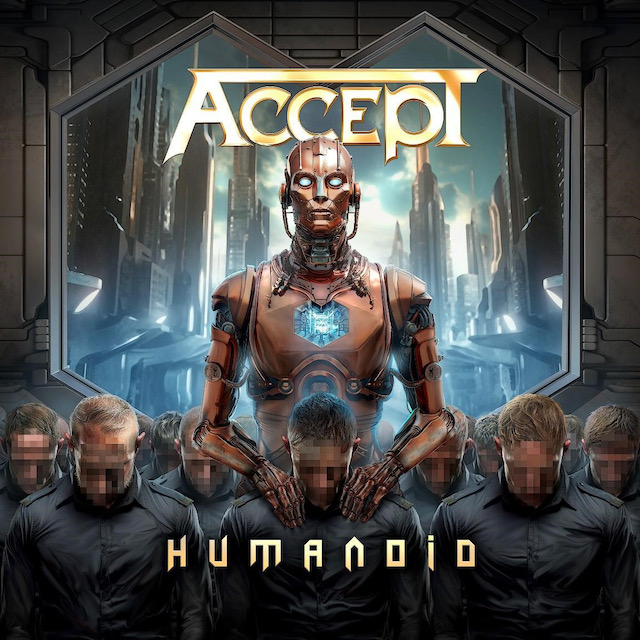
"Unbreakable" is as much about the band, as it is the bond between Accept and their fans, in the concert arena. "That's an easy going, "Hey, let's do this,' kind of rock song," begins Wolf. “We were struggling what to call it, because it's so riff based. We threw around a bunch of different names.”
"Mind Games" has a vintage feel, circa Metal Heart. "It has an earlier vibe. It's a little unusual, maybe not as aggressive as some of the others. It's a different flavor." He expounds on the lyrics. "Sometimes you wake up, from these anxiety dreams or nightmares. I think the best songs reflect on your own life, or someone else's and you just tell the truth. I've been thinking about dreams a lot, lately. I never have these beautiful dreams. I have lots of fucked up dreams. They're either quirky and weird, not making any sense, or they're downright nasty, terrible, where I have weird shit going through my head. Sitting on an island, the sun is shining and it's all peaceful? I never have those kind of dreams. I wish I did! Mind Games are certainly part of my life."
"No One Gets Out Alive" seems destined for the live set. It says that regardless of life's circumstances, rich, famous, or not, death is the great equalizer. Wolf agrees. "That's the gist of that song, We're all here just once, so might as well enjoy the ride. We've just stepped away from the studio experience, so we'll have to go through them all. See which one's we're going to try out live. I can't wait until we translate it all onto the stage." That can be a tricky process. "If I'm totally honest, there are some songs that don't work as well, live, as expected. We've had songs that we laid down, yet struggled to perform (onstage). In the studio, it's easy to layer stuff and get to a good song, but live, it's like, 'Fuck, how do I represent this live?' If you have to sing a backing vocal, while playing this really weird riff, on guitar, it gets a little hard, sometimes. So you adjust it a bit. On Russian Roulette, there were a bunch of songs, when we started to play them live, they didn't translate as well as we'd hoped."
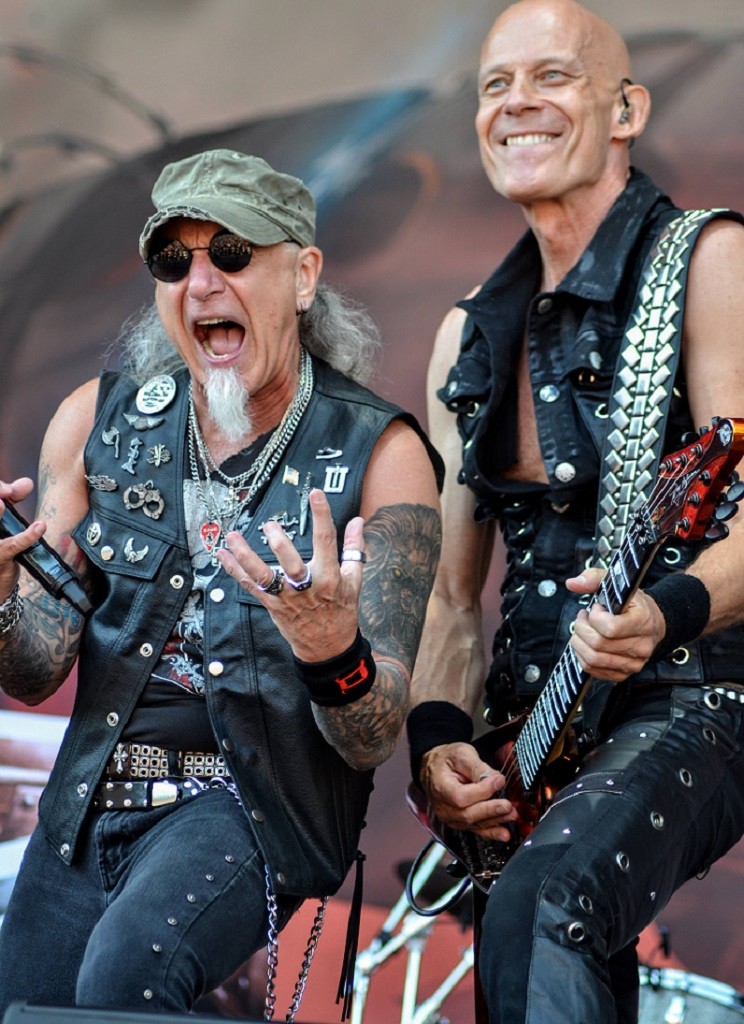
Upbeat and aggressive, with guitar interplay, "Southside Of Hell" ends the disc ends much as it began, but also with a wonderful bit of wordplay, courtesy of Tornillo. "I wrote the music to the lyrics. Mark had written the lyrics and handed them to me." Asked about the singer, Hoffmann gushes, "He and I sort of have seniority status. He's been in the band longer, continuously, than Udo ever was. Sixth album in a row. I feel lot of continuity there. It feels good, knowing he can sing anything we write. People ask me, 'Don't you get tired of playing 'Princess Of The Dawn'? It's such a simple song, monotonous, there's really not much in it... Rehearsing that song, is pretty boring. I'd rather skip it, but playing it live, onstage? It's a whole other ballgame. When the audience gets into it, it's one of my favorite songs. Odd, but the interaction, with the audience, the energy, that song is just a vehicle for that experience. It's not about how difficult it is, or how fun it is to play, it's the interaction with the crowd that brings it all to life."
No surprise, but Humanoid was, once again, produced by Andy Sneap. "He still wants to tweak it a little more," Wolf jokes. "For me, it's already good enough, but he's obsessed with it." Delving further into the producer's role, with Accept, he continues, "We always go through the music with Andy. He's sort of the referee, the mastermind who picks the songs he thinks are worthy of recording. They're not always finished (songs). Sometimes it's just a riff, or a vocal idea. If it speaks to him, then that's what we concentrate on. Either it grabs you, or it doesn't. A song can be finished and polished as you want, be if you go, 'meh,' it won't be on the album. It's not completely Andy's call, but I don't want to be the guy who decides everything, so I quite welcome his input. I ask him what he thinks, but that doesn't mean I don't override him, at times, but I'm grateful for a good opinion."
Humanoid is another winning collaboration between the two parties. Listen for yourself.









